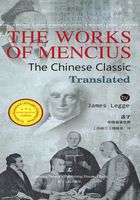
CHAPTER IV
1. P'ăng Kăng asked Mencius, saying, 'Is it not an extravagant procedure to go from one prince to another and live upon them, followed by several tens of carriages, and attended by several hundred men?'Mencius replied, 'If there be not a proper ground for taking it, a single bamboo-cup of rice may not be received from a man. If there be such a proper ground, then Shun's receiving the kingdom from Yâo is not to be considered excessive. Do you think it was excessive?'
2. Kăng said, 'No. But for a scholar performing no service to receive his support notwithstanding is improper.'
3. Mencius answered, 'If you do not have an intercommunication of the productions of labour, and an interchange of men's services, so that one fromhis overplus may supply the deficiency of another,then husbandmen will have a superfluity of grain, and women will have a superfluity of cloth. If you have such an interchange, carpenters and carriage-wrights may all get their food from you.


CHAPTER 4. THE LABOURER IS WORTHY OF HIS HIRE, AND THERE IS NO LABOURER SO WORTHY AS THE SCHOLAR WHO INSTRUCTS MEN IN VIRTUE.
1. P'ăng Kăng was a disciple of Mencius. His object in addressing him, as in this chapter, seems to have been to stir him up to visit the princes and go into office. 乘,—4th tone, following 车, as a numeral or classifier. 从者,—从, 4th tone, 'an attendant', 'a follower', not in a moral sense. 传,—the 3rd tone, explained in the dictionary by 绩, 'to connect', 'succeed to'. 以传, 'by succession'.—The phrase is felt to be a difficult one.
2. Sun Shih explains it thus:—'Mencius got his support from the princes, and the chariots and disciples got their support from Mencius. It came to this that the support of all was from the contributions of the princes, and hence it is said that by their mutual connextion they all lived on the princes.'箪食,—食(tsze), 4th tone, 'rice cooked'. Compare Analects, VI. ix. 尧之天下, 'Yâo's world', i.e. the kingdom from Yâo.舜 may be construed very well as the nominative to the first 以为.
3. 守先王之道以待后之学者,—the paraphrase in the合讲 is:


Here now is a man, who, at home, is filial, and abroad, respectful to his elders; who watches over the principles of the ancient kings, awaiting the rise of future learners:— and yet you will refuse to support him. How is it that you give honour to the carpenter and carriage-wright, and slight him who practises benevolence and righteousness?'
4. P'ăng Kăng said, 'The aim of the carpenter and carriagewright is by their trades to seek for a living.Is it also the aim of the superior man in his practice of principles thereby to seek for a living?''What have you to do,' returned Mencius, 'with his purpose? He is of service to you. He deserves to be supported, and should be supported. And let me ask,—Do you remunerate a man's intention, or do you remunerate his service.'To this Kăng replied, 'I remunerate his intention.'


—'He firmly guards the principles of benevolence and righteousness transmitted by the ancient kings, so that they do not get obscured or obstructed by perverse discourses, but hereby await future learners, and secure their having matter of instruction and models of imitation, whereby they may enter into truth and right.Thus he continues the past and opens the way for the future, and does service to the world.' 以待, thus,='for the benefit of'. The 梓 and 匠 are both workers in wood, the 梓人 's work being in smaller things, such as vessels and articles of furniture, and the 匠人 's in large, such as building houses, &c. The 轮人 made the wheels and also the cover of a carriage; the 舆人 the other parts.
4. Observe how appropriately 将, expressive of futurity or object, follows 志. 可食而食之,—here 食and the three that follow, are read as in 一箪食, but with a different meaning, being= 'to feed' (active or passive),


5. Mencius said, 'There is a man here, who breaks your tiles, and draws unsightly figures on your walls;— his purpose may be thereby to seek for his living, but will you indeed remunerate him?''No,' said Kăng; and Mencius then concluded, 'That being the case, it is not the purpose which you remunerate, but the work done.'